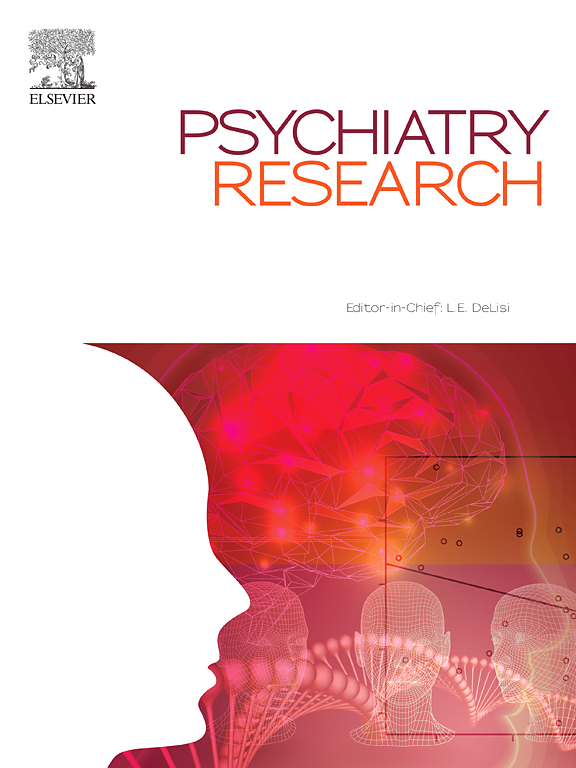Development and validation of a schizophrenia literacy scale for individuals diagnosed with schizophrenia
IF 4.2
2区 医学
Q1 PSYCHIATRY
引用次数: 0
Abstract
Schizophrenia literacy is key to early identification of schizophrenia and diminishment of stigma. This facilitates help-seeking and adherence to mental health treatment for individuals suffering from schizophrenia. However, validated measures assessing schizophrenia literacy among individuals diagnosed with schizophrenia remain limited. This study aimed to develop and examine the psychometric properties of a schizophrenia literacy scale for individuals diagnosed with schizophrenia. The scale development involved three stages: (a) generating an initial 43 items from a review of literature and existing measures assessing literacy about schizophrenia and knowledge of schizophrenia as well as cognitive interviews; (b) assessing content and face validities; and (c) psychometric testing using a cross-sectional design (268 individuals diagnosed with schizophrenia) to examine construct validity and reliability. Twenty-nine items were retained after evaluating content validity, face validity, and item analysis. Exploratory factor analysis yielded 22 items including five factors (awareness of mental health promotion; stigma against schizophrenia; causal beliefs; recognition of psychiatric symptoms; and traditional and religion-based healthcare) explaining 58.85 % of the total variance. Confirmatory factor analysis showed an acceptable fit of the factor structure. Cronbach's α was 0.95 for the total scale with test-retest reliability of 0.91. The newly developed 22-item schizophrenia literacy scale is a valid and reliable five-dimensional measure and could be used to assess schizophrenia literacy for individuals diagnosed with schizophrenia. The scale may help mental healthcare providers design interventions directed at improving literacy about schizophrenia and promoting mental health for individuals diagnosed with schizophrenia in Chinese-speaking regions and adapted for use in Asian countries.
精神分裂症患者精神分裂症读写能力量表的开发与验证。
精神分裂症知识是早期识别精神分裂症和减少耻辱感的关键。这有助于精神分裂症患者寻求帮助和坚持精神健康治疗。然而,在被诊断为精神分裂症的个体中评估精神分裂症素养的有效措施仍然有限。本研究旨在开发和检查精神分裂症扫盲量表的心理测量特性诊断为精神分裂症的个体。量表的开发涉及三个阶段:(a)从文献综述和现有的评估精神分裂症读写能力和精神分裂症知识的措施以及认知访谈中产生最初的43个项目;(b)评估内容效度和外观效度;(c)采用横断面设计(268名精神分裂症患者)的心理测量测试来检验结构的效度和信度。经过内容效度、面效度和项目分析,保留了29个项目。探索性因素分析共产生22个项目,包括5个因素(心理健康促进意识;对精神分裂症的歧视;因果信念;精神症状的识别;传统和基于宗教的医疗保健)解释了总方差的58.85%。验证性因子分析显示因子结构符合可接受的拟合。总量表的Cronbach’s α为0.95,重测信度为0.91。新开发的22项精神分裂症素养量表是一种有效、可靠的五维量表,可用于评估精神分裂症患者的精神分裂症素养。该量表可以帮助精神卫生保健提供者设计干预措施,旨在提高汉语地区精神分裂症患者的精神素养,促进精神健康,并适用于亚洲国家。
本文章由计算机程序翻译,如有差异,请以英文原文为准。
求助全文
约1分钟内获得全文
求助全文
来源期刊

Psychiatry Research
医学-精神病学
CiteScore
17.40
自引率
1.80%
发文量
527
审稿时长
57 days
期刊介绍:
Psychiatry Research offers swift publication of comprehensive research reports and reviews within the field of psychiatry.
The scope of the journal encompasses:
Biochemical, physiological, neuroanatomic, genetic, neurocognitive, and psychosocial determinants of psychiatric disorders.
Diagnostic assessments of psychiatric disorders.
Evaluations that pursue hypotheses about the cause or causes of psychiatric diseases.
Evaluations of pharmacologic and non-pharmacologic psychiatric treatments.
Basic neuroscience studies related to animal or neurochemical models for psychiatric disorders.
Methodological advances, such as instrumentation, clinical scales, and assays directly applicable to psychiatric research.
 求助内容:
求助内容: 应助结果提醒方式:
应助结果提醒方式:


